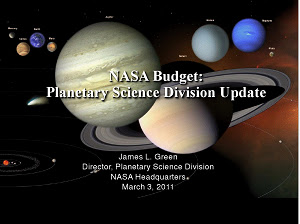Tonight, I came across a presentation by James Green, director of NASA's Planetary Science Division, given on March 3 of this year. It places the situation of the planetary program within the context of the latest FY12 budget proposal. You can read the entire presentation at http://solarsystem.nasa.gov/
Early on, Green presents the program's strategy:
After a review of the FY12 budget proposal, Green presents the results of the decline in projected out year funding (click on the images for larger versions):
Missions in flight or in development will continue. The slide states that the joint ESA-NASA Mars Trace Gas Orbiter mission will continue, presumably meaning that it will be developed and flown. There's a reference to establishing a "Joint Mars Exploration Program" with ESA. It's not clear to me what this means since I thought that one already existed. Possibly, this refers to replanning the joint Mars program if the MAX-C rover and its delivery system that will also deliver ESA's ExoMars rover cannot be afforded by NASA.
My next post(s) will be the official summary of the Decadal Survey's report and possibly the official response from NASA if one is available



No comments:
Post a Comment